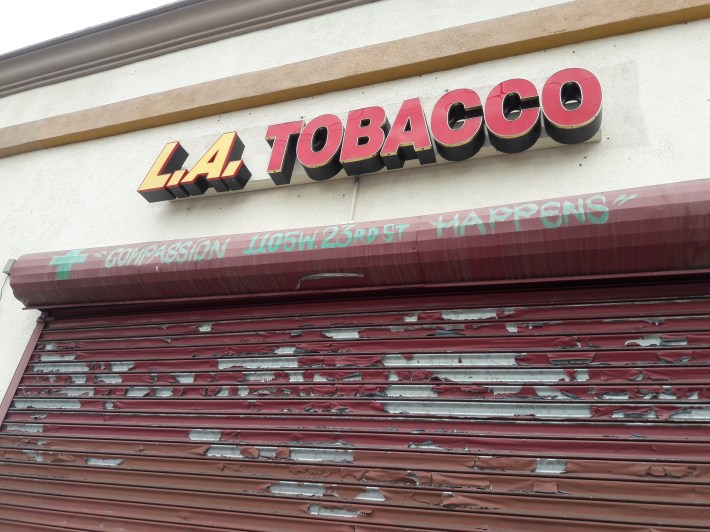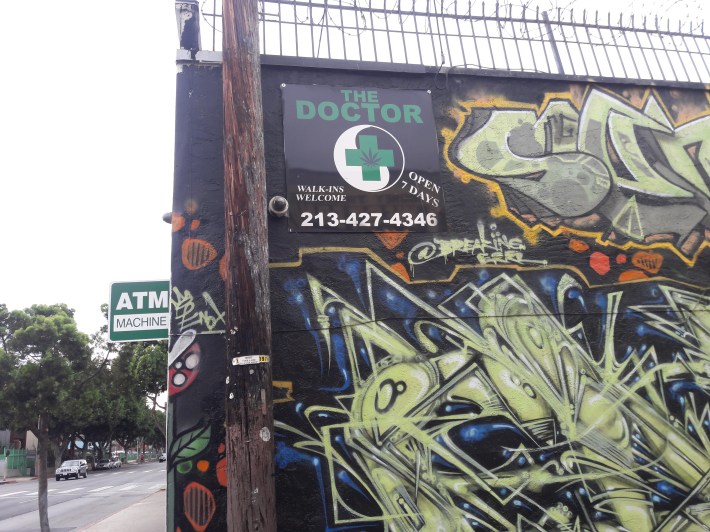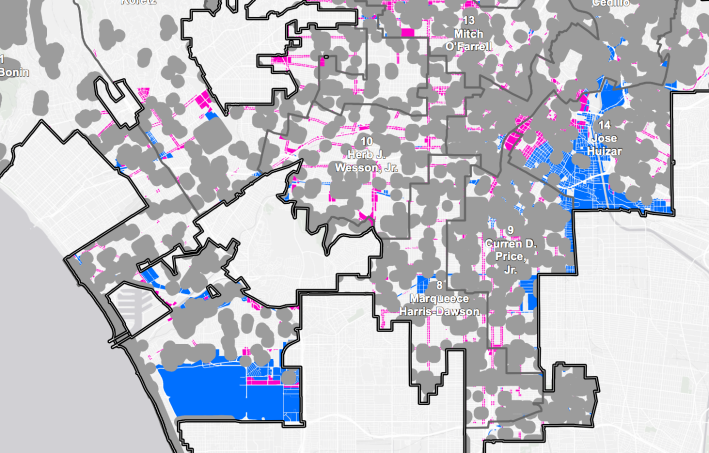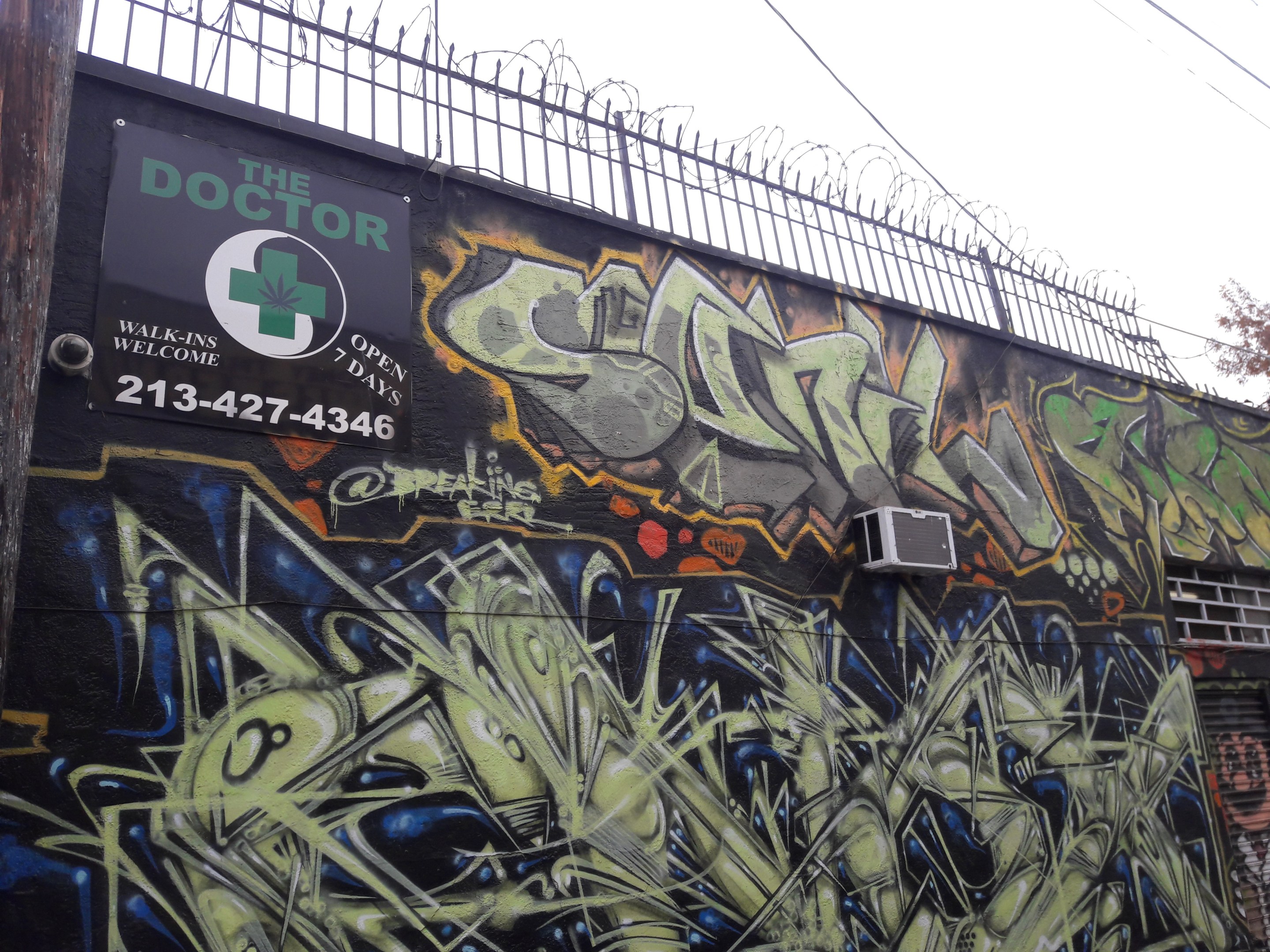The green cross of the pot shop on Pico Boulevard shines like a beacon behind the bars on a wooden doorway. At the edge of what’s now being called South Park by developers, this section of downtown, in the shadow of brand-new luxury apartment towers and on the edge of historic South-Central, is home to a bunch of these shops.
But there are no happy cameras clicking here today like up in the Bay.
In fact, the sign in black marker on white paper above the small window in the entryway clearly says: “No Cameras!” Right next to it, in the same marker: “No Hoodies, No Backpacks, No Phones, No Hats.”
With that last one, there is some flexibility: I get through by turning my hat around.
The small, papered-up window slides open. I hand my ID at the front, waiting to have to turn in a medical rec. Larisa, the receptionist looks down and starts typing. The security guard squeezes his head in from the back: “Gonna need your backpack though.”
This is Los Angeles, some 40 hours after Jan. 1, 2018, when many folks feared a total weed shutdown as the city figures out new regulations for legal cannabis in California. At this shop, though, Larisa tells me: “It’s been chill.”
Most places in L.A. where people get weed to smoke as they wish are like this. As the city enters a gray period with no certain end over how to implement recreational legal marijuana, hundreds of shops like this have been taking it easy … and waiting.
IDs are cool and all that is necessary to enter in many. Sativas are low. Indicas are plenty.
Larisa laughs when I ask if she got a big crowd yesterday, for January 1. “The usual.” She changes the subject. “But don’t you think it’s cold outside?”
I make it past the small ID window, through a plywood wall and door, across a vast and mostly empty warehouse that was once a showroom. Ana, the budtender, rises slowly to greet me.
“It’s been crazy till now, it finally slowed down,” she tells me. It’s late afternoon, before the after-work rush. For now, there’s a slow trickle of customers and a handful of other budtenders.
I find close to the same thing in three other shops down the way. IDs are cool and all that is necessary to enter in many. Sativas are low. Indicas are plenty.
Dabs (heated, potent weed concentrates) are fired up, and those trying them for the first time sit on black leather couches giving me ominous warnings, like, “You can’t trust anyone, man, not even the government,” or just trying to stand up.
The Other Side of the 135
Far from signs of a weed apocalypse, the first few days of legal marijuana might just be business as usual for the city of L.A.
Plenty of dispensaries kept their doors open in the last 72 hours, although Los Angeles is barely getting its application process for cannabis business licenses up and running. Many are still operating as if they are under the old medical collective system. [See Cannabis City No. 1: “No One Can Technically Buy ‘Legal’ Weed in L.A. Today.”]
Many more, like the shop where Larisa and Ana work, seem to be just under the same hope so many shops have had in the last decade: that they make it another day without a raid, a robbery, or any other trouble.
Cat Packer, chief of L.A.’s Department of Cannabis Regulation (DCR), held a joint press conference on Tuesday with the Los Angeles Police Department, confirming the city will indeed launch its application process to license medical and adult-use cannabis today, Jan. 3. This will give first crack at the 135-or-so Prop D-compliant shops and their suppliers within the coming days.

But a drive through Pico Boulevard in Mid-City, or Sepulveda in the Valley, or any other area where dispensaries have sprout up (or simply turn on Weedmaps in L.A.) will tell you there are a lot more than 135 fully compliant shops out there. In fact, just down the street from the spot I started at on Pico, I counted at least nine other dispensaries in operation.
So what’s ahead for the other thousand-plus shops that are active across the city? Depending on who you ask, there are anywhere from 900 to 2,000. Will they get in the door of the now-legal market?
‘This is a really cool time.’
Another shop I visited, practically sitting under the 10 freeway, seems poised to go legal. I’m greeted by huge, bright “Yes we are open” banners, and the “No hoodies” rap is typed and laminated. Instead of plywood walls, there are metal doors and glass, and medical recs are still the way to get in. They aren’t a Prop D shop, but they have been there for more than three years, and seem bent on staying.
“We’re definitely applying,” the budtender, Cindy, tells me, her excitement visible. “We’re ready for retail. This is a really cool time.”

The good news for L.A. is next in line after the Prop D-compliant shops for any kind of license are “social equity” applicants. These are operations run by either people with prior cannabis convictions or folks whole have lived for five or more years in communities with disproportionate cannabis arrests over the last two decades.
These of course include places like South-Central, Boyle Heights, MacArthur Park, and areas surrounding downtown. Existing shops that in the past have been prosecuted for doing exactly what is about to make some businesses a lot of profit will finally get their chance to apply. But more on this in a future column.
Now, the less pretty news. The vast majority of dispensaries in LA never got an official green light from the city, for any number of reasons: they opened after 2007; they missed a form or two and got disqualified; they didn’t have the right info.
More than 300 tried paying their taxes, even if they were not under Prop D, just to stay open. These shops now have much less legal cover than the shops and suppliers covered by Proposition D, which was passed in 2012. So every day after Jan. 1 that they stay open, they are in a trickier spot.

First and foremost, such spots are vulnerable to raids.
“The [LAPD] will continue to draw its attention to retail sales and cultivation that are sources of significant criminal activity,” said Michel Moore, the LAPD’s First Assistant Chief of Operations, at Tuesday’s presser. “We have found some of these locations have been operated by individuals who are ex-cons, or felons, if you will, or are hubs of gang activity or crimes of violence.”
But, a little history: at the height of Los Angeles’ raids against weed shops, in 2012 when the city attempted a full ban, the city attorney’s office would say they were operating on a “complaint driven” model. You’re basically likely to get a visit from the LAPD only if a neighbor — including possibly a rival shop — decides to call the cops. This model seems to be still in operation.
Under L.A.’s new pot laws, staying open can also lead to potential future citations when you do go above ground, or if you get targeted, and possibly even a straight-up denial of your eventual application by the state or city.
In Los Angeles, the Department of Cannabis Regulation has the ability to charge unauthorized shops up to $20,000 a day in fines and even apply misdemeanor charges. The City Council also recently voted to give the cannabis regulation department the ability to work with the L.A. Department of Water and Power to actually cut off water and electricity to these shops. At past City Council hearings, many of these measures were greeted with controversy and criticism.
“Citations sounds like a seventy-five dollar parking ticket, but we are talking about thousands potentially a day, when you add up per day financial charges against owners, individual employees, and the landlord,” said cannabis attorney Ariel Clark, adding that stacks of fees and other new penalties for targeted applicants could leave them with “the inability to do business for some number of years.”
Robert Chlala is chief cannabis correspondent for L.A. TACO. Follow him @RobertChlala.







